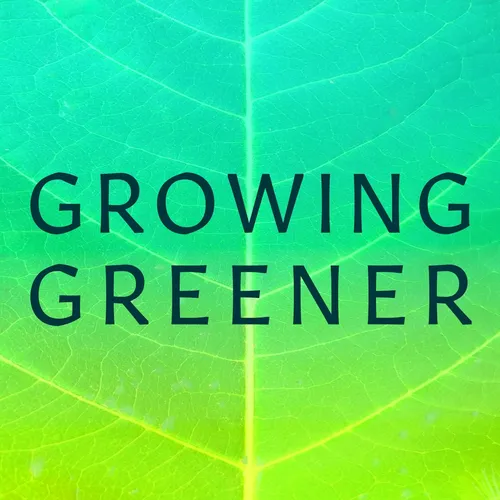
Growing Greener
Your weekly half-hour program about environmentally informed gardening. Each week we bring you a different expert, a leading voice on gardening in partnership with Nature. Our goal is to make your landscape healthier, more beautiful, more sustainable, and more fun.
- Update frequency
- every 7 days
- Average duration
- 29 minutes
- Episodes
- 318
- Years Active
- 2019 - 2025

Fighting Global Warming with Biochar
Biochar has been touted as a valuable soil amendment that fosters better plant growth and stretches fertilizer budgets. Will Hessert and Javaughn Henry have also found in it a means to sequester car…

Starting Native Plants From Seed
Starting native plants from locally sourced seed is the most economical and ecologically advantageous way to rewild domestic landscapes. In the past, though, this has been perceived as tricky and dem…

A Gardener’s Brawl Examined
Admirers of exotic garden plants have taken to claiming that their foreign-born treasures are just as good nutritionally for our North American pollinators. Proponents of native plants insist that t…

Drought-Proofing the Garden with Nancy DuBrule-Clemente
Managing water is the crucial task of the summertime garden, especially as climate change boosts the heat and the frequency of droughts. Join Nancy DuBrule-Clemente, founder of the pioneering woman-…

Learning to See With Botanical Art
Looking at plants is one thing; learning to truly see them is another. Carrie Roy, Acting Curator of Art, introduces us to one of the world’s great collections of plant portraits, the Hunt Institute…

Rebecca McMackin Bids Good-Bye to Brooklyn Bridge Park
Rebecca McMackin, a visionary horticulturist, has spent the last decade supervising the transformation of Brooklyn Bridge Park, 85 acres of abandoned shipping piers, into a complex of functioning eco…

Introducing Rewilding Magazine
Born in North America in the 1980’s, “Rewilding” has taken off in Europe, where it’s inspiring a return of broad tracts of marginal farmlands to functioning wild ecosystems. In this episode Canadian…

Creating an Eco-Friendly Native Lawn
Krissy Boys, Natural Areas Horticulturist of the Cornell Botanic Gardens, describes her chance encounter with a naturally compact grass native across North America, and how that led her to create a b…

The Real Story About Roundup
Veteran investigative journalist Carey Gillam introduces her award-winning book, “Whitewash: The Story of a Weed Killer, Cancer, and the Corruption of Science,” sharing its account of the collaborati…

Ending the Landscape Impasse
Dan Mabe, founder of AGZA, the American Green Zone Alliance, has taken on one of the bitterest impasses of contemporary suburbia. So many residents hate the noise and fumes of gas-powered landscape …

The Surprising Downside of #NoMowMay
#NoMowMay is an international movement that has been gaining widespread popularity in the United States. Its goal is to persuade gardeners to stop mowing their grass during the month of May so that …

Saving Nature One Yard At A Time
If each of us enriched our personal landscape with native plants, making it hospitable to pollinators, birds, and other wildlife, what an immense cumulative impact we would have! In Saving Nature On…

Town Joins Gown in an Environmental Partnership
Colleen Murphy-Dunning, director of the Urban Resources Initiative, describes how Yale University’s School of the Environment partnered with the New Haven community to design and implement a very suc…

A Leading Expert and Veteran Grower Publishes His Introduction to Gardening with Native Plants
Director of Horticulture at the Native Plant Trust in Framingham, Massachusetts, and former Curator of Native Flora at the Brooklyn Botanic Garden, Uli Lorimer has written a new book, The Northeast N…

Chemical-Free Strategies for Weed Control
Dr. Toni DiTommaso of Cornell University explains how familiarity with the ecology of weeds can help a gardener control their impact on the garden without resorting to toxic chemicals, and shares the…

Enrich Your Soil With a Different Take on Composting
With roots in traditional Korean agriculture, Bokashi composting has much to offer the contemporary gardener. Conway School graduate Boris Kerzner describes the process, explaining how you can pursu…

Irrigation In A Time of Water Shortage
Water is a resource plants cannot do without, and maintaining the right level of moisture in your soil – not too little and not too much – is critical to gardening success. That’s why pioneering hor…

Succession in the Designed Landscape
For 40 years, Larry Weaner, founder of Larry Weaner Landscape Associates, has been exploring the intersection of ecology with landscape and garden design, creating a style of planning, planting, and …

Reconnecting People and Prairie
Share my discovery of a Nebraska treasure: the Prairie Plains Resource Institute. For more than 40 years this organization has been perfecting low-tech methods of wild grassland restoration while re…

Studying Climate Change with Henry David Thoreau
To trace the impact of climate change on the plants and animals of Massachusetts, Dr. Richard Primack of Boston University turned to an unconventional source: the journals of 19th century philosopher…